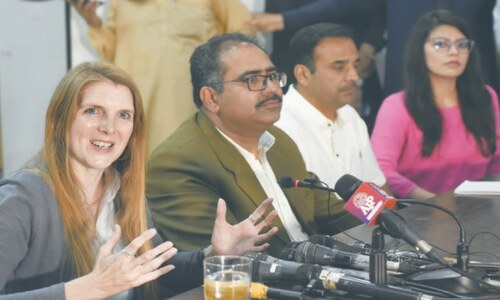ISLAMABAD: With Pakistan on the verge of eradicating the polio virus from the country, misconceptions regarding the vaccine being haram is still one of the bigger hurdles in the way of anti-polio campaigns.
A large number of people refuse to vaccinate their children because they consider doing so haram and attacks on polio workers are also often motivated by such misconceptions.
The government and donor agencies have taken a number of steps in order to remove this misconception, according to an official of the Ministry of National Health Services (NHS), who requested to not be named.
“We even conducted laboratory tests on all the vaccines that are used in polio campaigns last year in order to confirm that they were not haram. The ministry has also prepared answers to frequently asked question in order to convince people,” he said.
“The number of polio cases has reduced from 306 in 2014 to only 15 this year. We believe we can completely eradicate the virus but we still have to convince people that the vaccines are not prohibited in Islam,” he said.
In order to observe World Polio Day on Oct 24, the National Islamic Advisory Group (NIAG) Pakistan issued a statement urging religious leaders and communities to protect and cooperate with vaccination teams who are trying to administer the vaccine to every child.
NIAG was constituted in June 2013 and the International Islamic University Islamabad is serving as its secretariat.
In the statement, NIAG appreciated the efforts of polio teams and says it supports polio workers who put their lives at risk in order to administer the vaccine. A number of verses from the Quran and the sayings of the Prophet Muhammad (PBUH) are also included in the statement to convince people that the vaccines are not haram and urge them to support the anti-polio drive.
Though there was always confusion and controversy regarding polio and other vaccines in Pakistan but since Pakistani physician Shakil Afridi helped the CIA track down Osama Bin Laden in 2011 by conducting a fake hepatitis vaccine programme, the controversy has increased. In June 2012, the Taliban enforced a ban on polio vaccines in Fata and people also started refusing to vaccinate their children, arguing that the vaccines were haram.
Pakistan is one of the three countries, other than Afghanistan and Nigeria, in which polio cases are still reported. Due to the presence of the virus in the country, the Independent Monitoring Board for Polio which works on behalf of international donor agencies and issues bi-annual reports of various countries, recommended in November 2012 that travel restrictions be imposed on Pakistan, which was implemented on May 5, 2014.
Due to the restriction, Pakistan is bound to ensure that each person going out of the country should have had polio drops.
Published in Dawn, October 25th, 2016














































Dear visitor, the comments section is undergoing an overhaul and will return soon.